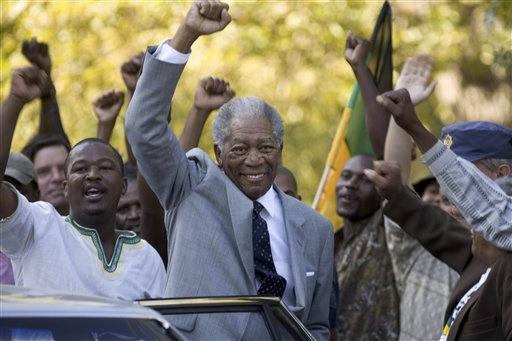
Warner Bros.| USA | 134 min
There is no question Clint Eastwood is a talented filmmaker; someone who knows his way around a camera and a story. No one would ever question as much. And perhaps that’s exactly the problem. Eastwood’s new film, Invictus, is one of the most heavy-handed, poorly-paced, lazily-shot films of the year, supported by a cardboard cutout screenplay courtesy of Anthony Peckham, who’s also got Sherlock Holmes coming out on Christmas. Eastwood is on autopilot here, and it shows.
Invictus tells the story of South African President and ex-prisoner Nelson Mandela and his unorthodox try at uniting his racially-torn country through rugby and, more specifically, the Rugby World Cup.
Very little in the film feels natural, from Morgan Freeman‘s practiced (and perfected) performance as Mandela to cinematographer Tom Stern’s ambitious-less camera. Sure, Freeman plays Mandela nicely and with poise, but the problem remains that he’s playing Mandela. Morgan Freeman never transforms into anything but Morgan Freeman playing someone else really, really well.
Matt Damon does a slightly better job with Francois Pienaar, the captain of the South African rugby team (the Springboks), but then has much, much less screen time and not a whole lot to do.
This is a surprisingly standard underdog story. And although it parallels as a tale of initial racial tension eventually overcome by forgiveness, it lacks any immediacy. Each scene lingers for a bit too long, lacking one or two key splices that could have sped the storytelling up. Subplots (the most interesting being Mandela’s estrangement from his family) are introduced and teased at and go nowhere. Mandela himself is never revealed in any real way. His character remains as mysterious (and as mysteriously pure) as the Pope.
One would love to believe that Mandela was exactly that – a saint. And there are moments in the film that suggest as much – he took a 1/3 of his salary and gave it to charity, and then there’s also the whole “forgiving the people that imprisoned him” thing, which Damon’s Pienaar spells out for the audience just in case they forgot.
Speaking of spelling things out, the music by Kyle Eastwood (Clint’s son) and Michael Stevens is occasionally interrupted by boy band Overtone and their horribly on-the-nose pop ballads. The worst of them is “Colorblind.” Yes, that is the title of the song. Can you guess what the context of it is?
Good guess. There’s really no narrative cue for the song when it appears in the film, which makes its blatant lyrics all the more obtrusive.
The same can be said for the last line of nearly every scene, each one a proclamation of some sort, as though each bit of dialogue, if taped together, makes up a larger speech for racial acceptance. This is bad writing by Peckham, the kind of lazy writing not usually adapted by high-caliber directors like Eastwood. That said, the film alone makes one question Eastwood’s ability as a director. Call it a big misstep.
All this criticism comes to a head in a scene at the beginning of the final rugby match, in which a plane flies suspiciously low and suspiciously close to the rugby stadium. Mandela’s bodyguards (who play large, shallow roles in the film) begin to panic as to the plane’s intentions. We cut to the pilots in said plane, one verbally taking responsibility for “what he’s about to do.” SPOILERS, what he’s about to do is nothing of any importance. History tells us there was no 9/11 kind of plane crash into the stadium, attempting to kill the president.
This is a cheap trick in something that’s selling itself as a racial sports drama. Not only does it take you out of the film, it’s puts a bad taste in your mouth. Even if something like this DID occur this way during the 1995 Rugby World Cup, why the need to cut to the pilots to up the ante?
Eastwood apparently hasn’t learned to cut sports scenes-there aren’t near enough close ups and the editing (by Joel Cox and Gary Roach) is disjointed and slow.We’re about as far away from the action as a football spectator sitting in his living room on Sunday afternoon. The camera constantly cuts back to spectator reactions, the same characters repeating the same reactions over and over. Freeman lifts his arms in rejoice over 10 times in the last 20 minutes.
For a true story so inspiring, the filmmaking feels extremely uninspired.
Did you see Invictus? What did you think?

